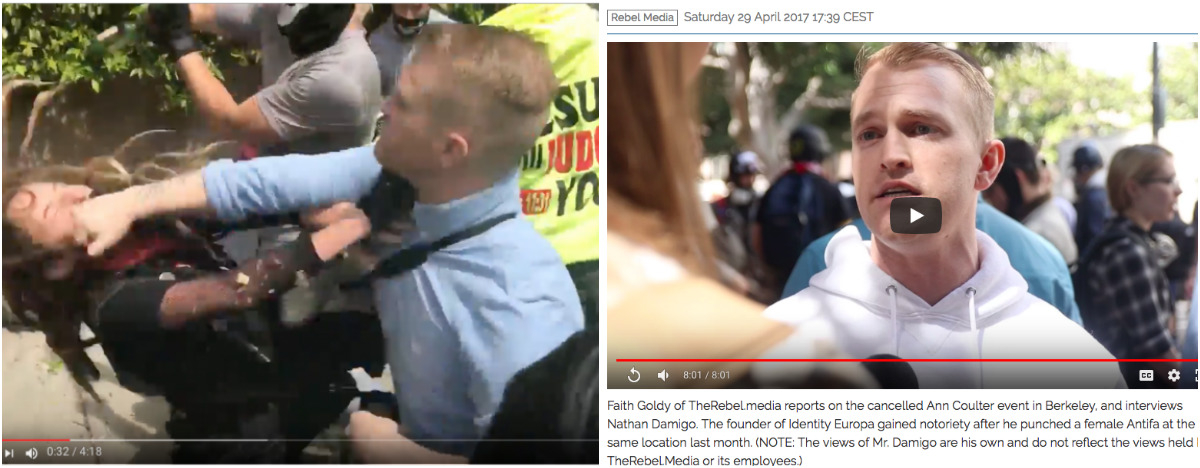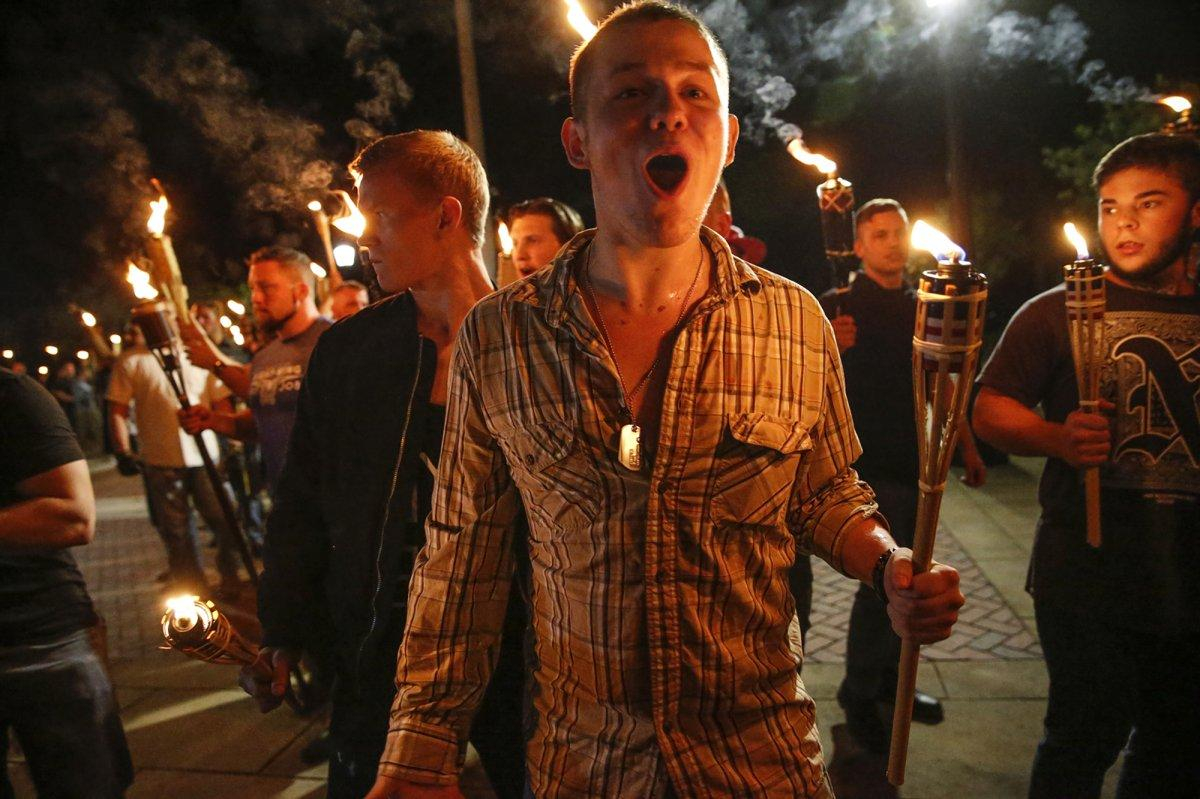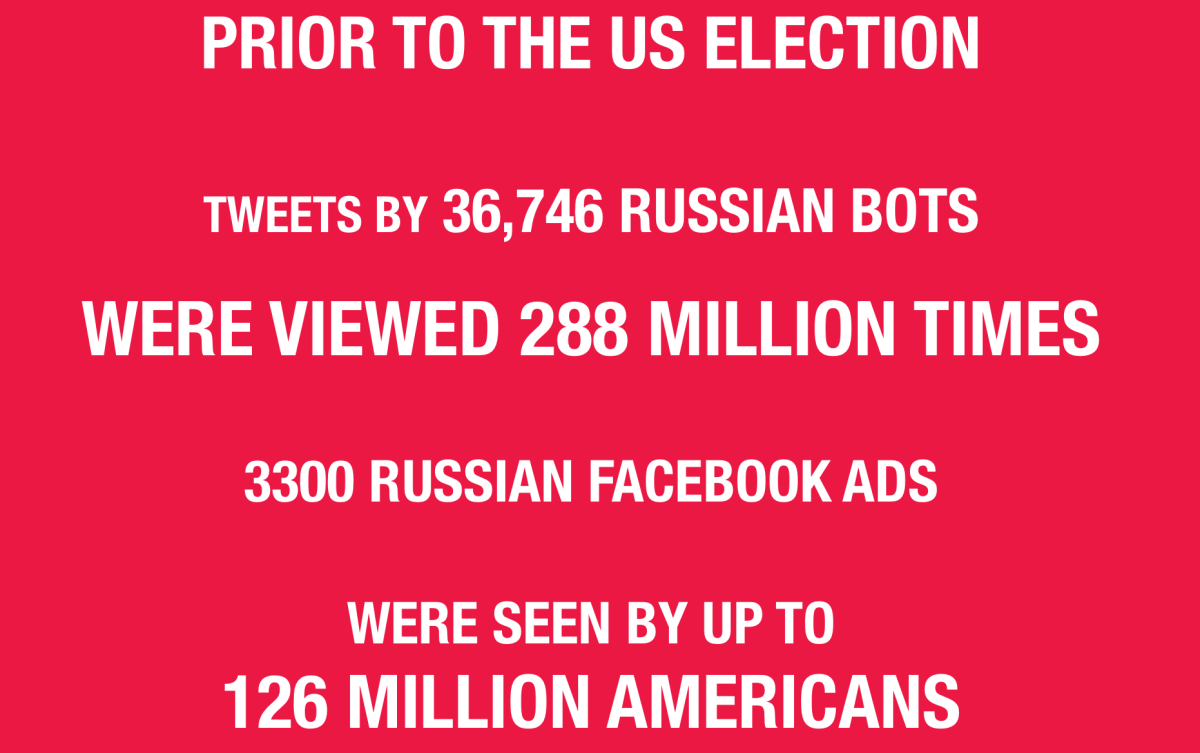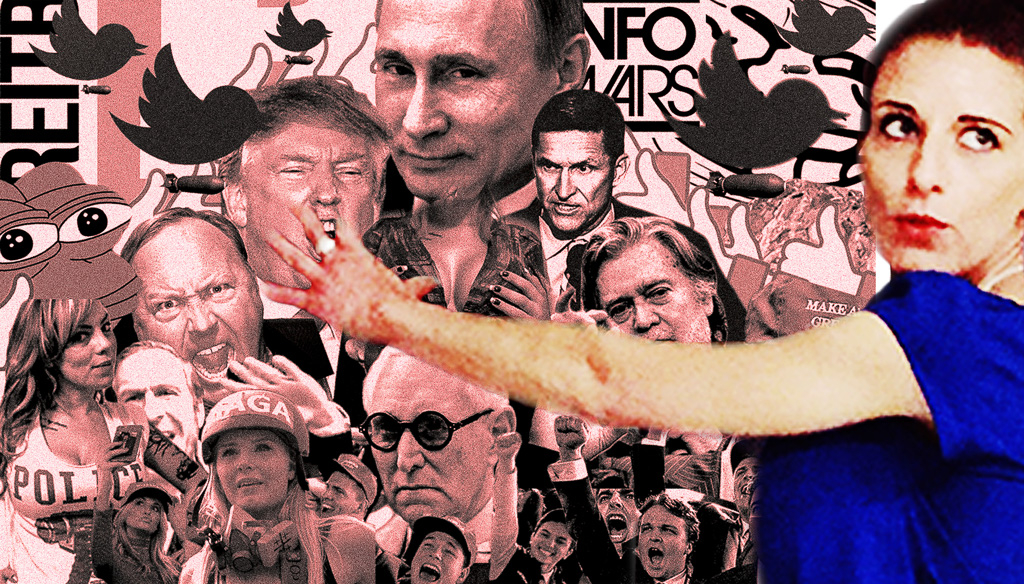Support strong Canadian climate journalism for 2025
For the next 50 years and beyond, we will look back on 2017 as a pivotal moment in American history.
This was the year that transformed Donald Trump from buffoon candidate into the president of the United States, and sent the globe careening toward the precipice over which it now teeters.
It was the year the world began to comprehend how deeply Russian propaganda has penetrated the American psyche. They used a wholly unexpected and lethal weapon — our own irresistible addiction to the Internet.
It was also the year that turned the scholar Caroline Orr into a social media sensation and must-follow for anyone hooked on U.S. Special Counsel Bob Mueller investigation into Russia and the Trump campaign. Better known to her hundreds of thousands of followers as @RVAwonk, Orr has emerged as one of the most incisive and compelling observers on Trump, Russia, and the propaganda wars now consuming world attention.
A social sciences scholar studying human interactions on the Internet, Orr watched the cyber-war continue unabated in real time. Her Twitter feed plays an invaluable role in decoding the cyber-mysteries of Trump and Russia for the amateur sleuth and average reader alike.

She even observed the curious role played by Canada's Rebel Media, and joined me for an extended telephone interview.
Garossino: Caroline Orr, as a doctoral fellow in behavioral sciences at Virginia Commonwealth University, how did you acquire such expertise in viral social media campaigns and the Trump-Russia controversy?
Orr: Well, like a lot of the other people who do this, I stumbled into it. My colleagues and I were looking at risk-based communication on social media. Do the behavioral and psychological theories that we’ve developed for real life apply to social media?
We studied topics from domestic violence to gun violence to Ebola to refugees, which set me up with a background to look at social media analytics from a more systematic framework.
When the Syrian refugee crisis became headline news and hashtags were trending for weeks at a time, we collected data on them. We pulled tweets, Instagram posts and Pinterest posts and analyzed them, and then I started to just see things.
Hashtags alarms
Orr: At first I didn’t quite know what I was looking at. We would pick one hashtag and then look at the others that were used frequently alongside it. People using the hashtag '#RefugeesNotWelcome’ were also frequently using – not surprisingly – hashtags related to Trump and the NRA.
And then there were a few others. Rape was one.
People were exploiting the refugee crisis and using it to evoke fear. The hashtags talking about guns and rape were a really emotionally charged theme that made the world look chaotic and frightening.
Enter the robots
Orr: I stayed up oftentimes into the early morning hours, and started to notice at 2, 3 and 4 a.m., patterns of Twitter activity that were just weird.
I had a baseline understanding of what normal activity looked like, what automated or bot activity looks like, and what heavy traffic looks like. Hashtags appearing out of nowhere at three in the morning are not normal unless there’s breaking news.
One of the first ones that I really dug into was the hashtag #MediaLiesAgain, which just popped up out of nowhere and all of a sudden had thousands of tweets associated with it. I ran some basic analytics just to see what the activity looked like over time, and who were the top people tweeting about it.
The activity pattern was very abnormal. Beyond the time factor of being 3 a.m., these tweets were being pushed in waves. You’d see these big spikes in activity where a bunch of tweets will come out all at once and then it drops back off.
Normally, if you have a hashtag that’s gaining momentum, it goes up and down a bit, and keeps rising. It doesn’t drop back down to zero.
This pattern was not organic — it was not people sitting at their computers deciding all at once to tweet about media lies. A couple of the tweets were geo-tagged to Macedonia, which was known to host these fake news farms.
Many of these accounts had just been created and had 10 or 15 followers. They were not American accounts — most of their networks and most of their own tweets were in Cyrillic.
This was not just a random occurrence, this was something happening.
The same thing would happen when a large news story dropped about the Trump administration or the Russia investigation. That pattern has continued for the better part of a year now.


Garossino: For readers who may not follow social media closely, can you explain how a low-visibility Twitter or social media account with very few followers can propel its message using hashtags?
Orr: Yes. One metaphor is to think about the narrative that you want to push as a person, and these other, smaller accounts as little people who are holding that person up on their shoulders.
Without all of those little people holding him up, the big person or the narrative would just blend with everything else. But if you have all of these little people doing their job and boosting it up, it will break through the traffic.
At three o’clock in the morning it doesn’t take much to break through the existing traffic on Twitter. If you were to try it at eight o’clock in the morning or five o’clock in the afternoon, it’s harder because more people are using Twitter and there’s more activity.
One of the ways that social media and Google search engines determine what should appear first in a search result or trending hashtag is how many external and internal links are pointing to a specific story, or how many users are using a hashtag.
If you have a narrative that you want to make a trending narrative, a couple hundred or a thousand accounts tweeting about the same thing and using the same hashtag will do it.
So, a Trump voter sees other seemingly Trump voters tweeting about something, and naturally they’re interested, so they look and they start tweeting about it. And then people in their network notice and then they start tweeting about it.
The real goal is to get people who look like your people to see it and to start picking it up themselves and make it become an organic movement.

Garossino: Some key figures close to the Trump camp are associated with the more visible anti-Clinton campaigns like Wikileaks and #Pizzagate, which claimed that Hillary Clinton ran a child sex trafficking ring out of a D.C. pizza parlour. Alt-right media figures like Alex Jones, Mike Cernovich, and Jack Posobiec were all instrumental in promoting Pizzagate, which led to a shooting at the restaurant.
Many of these campaigns have either been traced to Russia or have concurrent Russian social media activity. Cernovich, Posobiec, Jones, Milo Yiannopoulos and Roger Stone have frequently been linked to these campaigns. What have you seen on that front?
Orr: That’s one of the areas that is both most intriguing and under-estimated in the public discussions about the Mueller investigation. You know, we hear a lot of names, we hear Manafort, Mike Flynn, and Carter Page. But we don’t hear a lot of the names that are associated with the Trump campaign, social media campaigns, and these very far-right media companies.
Some of them, like Milo Yiannopoulos, have branched off more into the real world, but others like Jack Posobiec, Mike Cernovich and Paul Joseph Watson of Prison Planet — which is an Infowars site — their role in all of this appears to be to distract and to plant disinformation, doubt, confusion about things at strategic points in time.
Casual observers of the news really don’t grasp just how significant this is.

- Read more on Posobiec, Cernovich, Russia, the French presidential election, and their interaction with @TEN_GOP, a Russian Twitter account masquerading as American.
- Read more on Mike Flynn Jr's relationship with Cernovich, Posobiec, and Cassandra Fairbanks.


In terms of avenues that I hope are being explored by Mueller is the social media and media co-ordination with Cambridge Analytica, some of the right-wing news organizations, WikiLeaks, and some of these individuals. There comes a point where there are just too many coincidences.
If you look at Michael Flynn Jr’s Twitter account, and Flynn’s, the number of accounts that they interacted with that have since been identified as Russian-backed accounts, it’s a little hard to believe that they had no idea that they were re-tweeting and actively promoting content from accounts that were funded and run by the Russian government.

You have Donald Trump Jr. talking to presumably Julian Assange or at least a representative of WikiLeaks, and people like Flynn pushing WikiLeaks after it was known and announced by U.S. Intelligence that WikiLeaks was acting as an agent of Russian intelligence. There’s just a lot of questions that I would like to see answered.
Reportedly, Breitbart, Infowars and Cambridge Analytica are now being scrutinized by Mueller. This Flynn (plea deal) may open a lot of floodgates to that right-wing media ecosystem, and also to some of the data operations.
One person we haven’t talked about is Brad Parscale, who ran the data operations during the Trump campaign along with Kushner, Trump’s son-in-law who oversaw them.
And the data operation, again, of the Trump campaign, we don’t know where the official affiliations with the Trump campaign end and where the unofficial ones start. They played a key role spreading Russian-funded propaganda. Maybe they don’t know where it’s coming from.
Garossino: Although they’re close to Sputnik News correspondent Cassandra Fairbanks. There were a lot of these associations, direct links with operations that were transparently Kremlin-funded or Kremlin-directed. I don’t think that anybody could claim that they had no knowledge at all of these relationships, could they?
Orr: No. Not these big names that we’re talking about, because for one thing, the reason that Infowars (which hosts Cernovich) and Breitbart are under investigation right now is because of how closely aligned their coverage was with Russia Today and Sputnik. There are certain storylines and narratives where they were pushing out the same stories almost literally down to the minute, and it’s hard to believe that that was a coincidence. The really disturbing part is that it hasn’t stopped.
Invasive data on more than 200 million Americans
Garossino: Can you give us a primer on Cambridge Analytica? How did that operation work and what is its significance in the questions about voter influence?
Orr: So Cambridge Analytica grew out of research done by Cambridge University researchers, who then took it into the private sphere. The firm originally grew out of military strategies and the military industrial complex. The people who run Cambridge Analytica's parent company, SCL, ran the psychological operations for British forces in Afghanistan. People who were literally designing PSYOPS and information warfare in a military setting are using those same tactics on a civilian population.
Another disturbing piece of this is how they have accessed our data, and what they’ve done with it.
I’ll start by saying we still don’t exactly know how and what information they have on U.S. citizens. We know they did use Facebook in a huge way, and now have 5,000 data points on more than 200 million Americans.
Garossino: What can you tell us about Robert Mercer, Donald Trump’s largest donor and the major financial backer of Cambridge Analytica?
Mercer and his family are the money behind Cambridge Analytica. He also funded Breitbart and continued to fund them until just a few weeks ago, when he sold or gave his stake to his daughter.
But the Mercers are kind of secretive, they are more behind the scenes, but they need to be known by more people because when you look at all of what they’re funding from these right wing news sites like Breitbart to Cambridge Analytica to Milo Yiannopoulos to Project Veritas.
When you look at the ventures they’re funding and how deeply connected they are into the media ecosystem, it paints a picture that is really startling.
It looks like this billionaire class trying to own what information you are allowed to access and the information space. And if you own the information space, you really own the future. If you can silo off the truth and create an alternative reality where you tell people what you want them to hear, and you block them off from seeing and hearing other information through manipulating search algorithms and other things, it’s scary.
Garossino: Now we’ve got Jack Posobiec in the picture, which brings us to Canada’s Rebel Media. Jack Posobiec, for the early part of 2017, was the Washington bureau chief for Rebel Media, which at the time was fanning anti-immigrant hatred in the United States under the free speech banner.
It was a very curious position for a Canadian media outlet to be taking in the United States. Can you tell us about what you observed with Rebel Media and Jack Posobiec and some of the other figures involved in that media organization?
Orr: That’s one of my favourite topics. One of the first times that Rebel really caught my attention was during one the protests at Berkeley when they were sending their – I can’t use the word ‘journalist’ because they’re not journalists. So whatever you want to call the people who work at Rebel Media.
Garossino: Provocateurs maybe.
Orr: Yes, yes. Agitators. They were sending them down to Berkeley and I remember seeing Gavin McInnes and Lauren Southern — a lot of these people are no longer working for Rebel. And there were pictures of Lauren Southern in goggles and a helmet and posing with people holding sticks and shields. And not the kind of thing you do if you’re just going down to cover an event. You know, she was an active participant in things.
Garossino: She was a headliner. Southern parted ways with The Rebel at about that time, but continued to be featured on the site.
Orr: She was. Then she talked about how the Antifa black bloc were going to be violent and how they needed to defend themselves.
Basically setting the stage so that people showed up ready for a fight regardless of what it actually looked like on the ground. They would then go and film the fight that they had taken a pretty large role in orchestrating. And then report on it.

I use the word ‘radicalization,’ because that’s what it looked like. Promoting the idea that there’s a need to defend against this threat to American identity and American ideals, while dehumanizing chunks of the population as dangerous to you, your identity, and your future.
One of the things about Rebel Media is that I would like to find out more about is that they seemed to employ people who go and create news for them to cover. We saw that in Berkeley. In that instance, it was more that they were inflaming an event and making it more sensational.

Garossino: It was so odd that by and large, these were Canadians apparently representing The Rebel at Berkeley. They were visitors to the United States agitating against foreigners in the U.S. Which they themselves were.
Orr: There are uncanny similarities between some of the actual content and style of graphics and videos between Rebel and some of the Russian propaganda that we’ve now uncovered over the past year.
There are just certain elements of fear-based and very emotionally-laden imagery and phrasing and even the text, the way certain text appears on images. This bold, all caps evokes almost an emergency response from people who see it.
This draws on some of the research that I have done on risk communication in social media. We know that there are certain elements of messaging that resonate emotionally with people. That includes big, bolded texts and certain types of imagery.
And they’re quite interesting if you look at how it has coincided with Breitbart, Infowars and Russian propaganda. Whether it was official or coincidental, they appeared to work in conjunction.
Information warfare is radicalizing young white males
This type of information warfare is so different than anything we’ve dealt with. It’s very easy for co-ordinated disinformation campaigns to make their way into mainstream media and public opinion. You can see it in the coverage (of anti-fascist protests) that makes all protesters appear as if they are violent black bloc, and these ideas are seeping into the mainstream coverage.
The thing to emphasize here is that these aren’t just fringe outlets, although the ideas that they are promoting are fringe. Their influence has a much larger reach and resonates much more deeply, and influences the political climate around the world a lot more than a lot of us are aware of and, at least in the U.S., drives politics.
And they’re playing a pretty significant role in shaping and, in some cases, radicalizing young white males, which is really concerning because that’s not going to go away with one election.

Garossino: As a behavioural scientist, do you have an opinion about whether exposure to this degree of messaging affects behaviour? Could it affect voting behaviour?
Orr: Behavioral theories tell you that if you want to change people’s behaviour, the first thing you do is target their attitudes and social norms. If you can make a Trump voter believe that other Trump voters support or oppose something, they’re more likely to take that view on as their own.
So a huge part of these hashtags campaigns and what goes on in social media is manipulation of people’s perceptions of what people like them support, think, and do.
We already have our evidence that this affected behavior. There was a series of stories about Russian-backed efforts to mobilize activists in the U.S. and they motivated people to go out and have flash mobs in Florida and protests out by the White House and protests in Baltimore.
Garossino: And this would also apply to a Sanders, Jill Stein or Clinton voter?
Orr: Absolutely. We know now that these some of these efforts did target — especially Bernie Sanders voters — to turn them off from Hillary Clinton, and it worked pretty well.
So did Russia flip the U.S. election?
Garossino: As a scientist, what evidence would you look for that Russian interference may have influenced the outcome of the election?
Orr: It’s going to be hard to ever definitively say whether or not the outcome of the election was changed. There’s been pushback from Trump supporters, but also from some on the far left that Facebook ads couldn’t have possibly influenced the election.
But that’s such a gross over-simplification of what actually happened.
Yes, you’re dealing with a limited number of purchased ads that can be directly linked to a Russian government-backed operation, but you’re not looking at all of the people who picked those ads, the visuals and the messages up, and spread them organically onto other platforms.
One of the ways we can get at least closer to finding an answer to that is to look at some of the targeting and geo-targeting where different messages, different ads, different propaganda was targeted to voters in different areas.

Raw data doesn't reveal targeted campaigns
Orr: One of the most insidious aspects of all is that this is not being distributed throughout the entire population, it’s targeted to specific people who are identified as being susceptible to certain messages.
You and I probably wouldn’t ever see the type of propaganda that would be targeted toward a certain type of Trump voter. So voters in certain parts of Florida were hit with what are called ‘dark ads.’ Nobody saw them except the people targeted, and they’d be different in Florida versus Michigan.
I don’t know if we will ever be able to definitively say if the outcome of the election was changed. However I would be very surprised if (Russian active measures) did not change voter behavior.
No president has ever lost the popular vote by such a large margin (almost 3 million votes). The election hinged on about 80,000 votes across three states, out of almost 140 million votes cast.
That’s a tiny, tiny number of votes, in just the right places.
Closing thoughts by Garossino
Caroline Orr's cautionary tale is not confined to the 2016 U.S. election campaign. Russia was active in the 2017 elections in France, the Netherlands, and to a lesser extent, Germany. Malicious online actors continue an unrelenting campaign to disrupt and undermine the public trust in traditional journalism.
A decisive U.S. Congressional mid-term approaches in 2018. In an unsettling echo of America's 2016 race, Canadians heading to the polls in 2019 will encounter a Conservative Party campaign run by one of Rebel Media's founding directors.
Meanwhile, virtually unregulated online data harvesting continues to increase at an exponential rate, and Cambridge Analytica's services continue to be offered for sale to political parties.
Nothing has been solved. Far from it. The problem as yet is only dimly understood by critical democratic institutions — the press, the judiciary, and governments themselves which must somehow find the steel to grasp this nettle.
But after all, why not leave the last word to Steve Bannon? As he mulls his own future political chances, Bannon recently told Vanity Fair that the government should regulate Google and Facebook like public utilities.
“They’re too powerful," said the man who directed Donald Trump's winning campaign.
"I want to make sure their data is a public trust."
[Editors' note: Rebel Media founder Ezra Levant was reached for comment, but did not provide answers to questions.]
With files from Jenny Uechi






Comments
~If it smells like funk it must be us... we keep it stinky~ The Black-eyed Reformacons
The first thing I did was SHARE this story. Click on the links provided and SHARE it widely.
Thanks so much for sharing, Graham!
Interesting interview. I wish I had better skills for computer software use. So much on Facebook appears once and then disappears not to be seen again in some cases, in others it shows up 6 to 8 months later
Moral of the story: Review what you circulate be fore hitting the send button. In a number of cases I've found information to be faulse.
That is the big picture that we need. I tried to share on Facebook but denied “because too many redirects have occurred”. Is anyone else blocked from sharing? Canadian voters are vulnerable. Election rules only audit one small outcome , we-recount close losses. Nothing else such as security of advance polls, mail in ballots or vote count machines are audited. Public reports are not made by Election officials on numbers of complaints by voters,patterns,systems . Trump won with a”tiny, tiny number of votes in just the right places.” The entire voting system needs to be audited randomly to see the weak spots in just the right places because they are there.
Hi Hazel, Thanks so much or alerting us about this issue. We'll see what's happening that has caused this.
Trump just mangled a quote from Stalin to the effect that the voters were less important than those who count the vote. Giving away the origin of the GOP push to suppress votes and control who gets to count the votes. This labeling of liberals as "commies" is the purest projection the GOP can muster to mask their own autocratic intent.